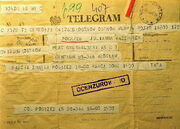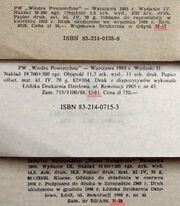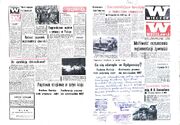Poland 🇵🇱 is a Central European country which practices Catholic Christianity. Censorship was pervasive during the Communist rule between 1946 until 1989, when Lech Walesa (leader of the labor union Solidarity, who opposed the Communists) became President. It has been a member of the European Union since 2004.
The freedom of the press is guaranteed in both the modern Constitution of Poland (1997) and in the revised press law. Another article of the Constitution explicitly prevents preventive censorship, although it does not prohibit post-publishing repressive censorship which in theory might be not incompatible with the modern Polish law.
General censorship[]

A telgram censored in 1982.
Article 196 makes anyone found guilty of intentionally offending religious feelings through public calumny of an object or place of worship liable to a fine, a restriction of liberty, or to imprisonment for a maximum of two years.
Article 256 makes anyone found guilty of promoting a fascist or other totalitarian system of state or of inciting hatred based on national, ethnic, racial, or religious differences, or for reason of the lack of any religious denomination, liable to a fine, a restriction of liberty, or to imprisonment for a maximum of two years.
Article 257 makes anyone found guilty of publicly insulting a group or a particular person because of national, ethnic, racial, or religious affiliation or because of the lack of any religious denomination liable to a fine, a restriction of liberty, or to imprisonment for a maximum of three years.
During the presidency of Andrzej Duda, press freedom deteriorated precipitously in Poland when public broadcasters became mouthpieces for Duda and PiS, and reporting became less free. The conversion of Polish public media into state propaganda is often dubbed as repolonizacja (repolonisation) by the press. Duda's presidency targeted their critics and even tried to silence them. Poland's ranking on the Press Freedom Index by Reporters Without Borders dropped from 18th in 2015 (when Bronisław Komorowski left office) to 64th as of 2021.
Book censorship[]

Colophons (imprints) in three books published during Polish People's Republic era. Identifiers of censors are underlined.
During the Communist rule, the Polish Main Office of Control of Press, Publications and Shows (Główny Urząd Kontroli Prasy, Publikacji i Widowisk), a governmental institution created in 1946 by the pro-Soviet Provisional Government of National Unity with Stalin's approval and backing, and renamed in 1981 as the Główny Urząd Kontroli Publikacji i Widowisk (GUKPiW), was in charge of the censorship in the country. This organ systematically cleansed library collections, destroyed most books and isolated others in Party or academic libraries. A list of prohibited publications and black-listed writers was created in 1950 during the darkest years of Stalinism in Poland with some 1,682 items, and subsequently modified many times by the Communist authorities in the Polish People's Republic. Some writers who were popular before World War II, such as Wacław Kostek-Biernacki who was sentenced to death as an "enemy of the state in 1953", had their books removed from libraries and meticulously destroyed.

A censored regional newspaper that reported about the Bydgoszcz events, in which the militia abused Solidarity members. The censorship was to prevent the slander of state services.
During the rise of Solidarity movement in 1980, independent editors could indicate, with a sequence [----], a censored fragment instead of hiding these deletions or withdrawing their entire publications. Publishers demanded the right to leave a white space to indicate the amount of cut text, but that was rejected. However the change spelled a setback for GUKPiW and interventions were less common: an article with dozens of cuts might have a greater impact on the readers' minds than the words missing. The censorship law was eliminated after the fall of communism in Poland, by the Polish Sejm on 11 April 1990 and the GUKPiW was closed two months later. The decades of relentless censorship fed the underground press and publications in Poland (called bibuła in Polish). The censorship law was suppressed after the fall of communism in Poland, by the Polish Sejm on 11 April 1990 and the GUKPiW was closed two months later. The closing of the GUKPiW has been described as "the formal and legal fact of lifting censorship [in Poland]" and the year 1990 has been said to have seen the "definite elimination" of censorship in Poland.
- Mirror of the Polish Crown - this Anti-Semitic pamphlet published in 1618 was banned by King Sigismund III Vasa for being one of the causes of the anti-Jewish riots in Krakow.
- Mein Kampf, Adolf Hitler's manifesto, was banned in Poland until 1992.
- Any work by the poet and translatorJózef Łobodwski was banned by the regime due to him being opposed to Communism.
- Tygodnik Powszechny - This weekly was temporarily closed by the authorities in 1953, due to the newspaper refusing to publish Joseph Stalin's obituary.
- Dariusz Ratajczak's book, Tematy Niebezpieczne ("Dangerous Topics") caused controversy for denying Holocaust, involving its author in a court trial.
To avoid censorship, throughout the periods that censorship affected the Polish writers, some authors turned to self-censorship, others attempted to cheat the system with metaphors and Aesopian language, and yet others had their works published by the Polish underground press.
Internet censorship[]
A plan for internet censorship legislation that included the creation of a register of blocked websites was abandoned by the Polish government in early 2011, following protests and petitions that opposed the proposal.
All websites that offer gambling games that are not owned by the Totalizator Sportowy (which belongs to Trésor public), and sites that sell illegal "items" (for example, boosters), and parties that are recognized as a threat to state security, were blocked.
Some Russian sites have been blocked due to the ongoing Russian invasion of Ukraine.
Movie censorship[]
Ratings in Poland are not set by any board or advisory body. Prior to 1989 the applicable age ratings were "no age limit", "over 7", "over 12", "over 15" and "over 18" and were set by The General Committee of Cinematography. Since 1989 there is no official classification system, with age ratings being self-prescriptive and set by the distributors.
- All Quiet on the Western Front - banned in 1930 due to it being "pro-German". Ironically, Nazi Germany banned it for being "anti-German".
- The Wind from the East - banned in 1945 for anti-Polish sentiment and historical distortions of the Soviet invasion of Poland.
- Australia Marches with Britain and Men of Timor were banned in 1946 with no reason given.
- Ręce do góry (Hands Up!) - this 1965 Polish movie was banned during by the Communist government for 18 years for depicting Poland's Stalinist past. As result of this, its director, Jerzy Skolimowski, was so outraged that he left his country and moved to the West.
- Diabeł (The Devil) - this 1972 film was banned by the government for its political anti-war theme.
- Opowieść o człowieku, który wykonał 552% normy (A Story of a Man Who Filled 552% of the Quota), Wanda Gościmska. Włókniarka (Wanda Gościmińska. A Weaver) and Elementarz (The Primer) were banned by the Communist authorities for depicting the Stalinist past. The ban on these movies was lifted only after the death of their director, Wojciech Wiszniewski, in 1981.
- Spokój (The Calm) - this 1976 film was banned because its plot was about a strike and the director Kieślowski claimed that it had nothing to do with politics and simply told the story of a man who wants very little and can't get it. The ban was lifted after the film was finally shown on Polish television in 1980. In 1981, The Calm received the Special Jury Prize at the Polish Film Festival.
- Indeks. Życie i twórczość Józefa M. (The Index) - this 1977 film was banned for depicting the 1968 protests.
- Był Jazz (There was Jazz) - this film was banned in 1981 by the Communist government.
- Człowiek z żelaza (Man of Iron) - this film was banned for its political criticism and its depiction of labor union Solidarity.
- Gorączka (Fever) - banned for brutally realistic portrayal of the occupying Soviet forces.
- Jak żyć (How to Live) - banned twice in 1981 by the government.
- Wojna światów – następne stulecie (The War of the Worlds: Next Century) - this film was banned in 1981 for depicting a futuristic society which showed parallels with the Polish society of the time. It was unbanned in 1983.
- Wahadełko (Shilly Shally) (Shilly Shally) - banned by the Communist regime for three years due to its depiction of the Stalinist past.
- Dreszcze (Shivers) - this 1981 film was banned for being a satirical story about a teenager imprisoned at an indoctrination camp. Unbanned in 1984.
- Wielki bieg (The Big Run, also translated as The Big Race) - this 1981 movie was banned for six years by the regime for its political criticism.
- Blind Chance - this film was banned for showing a storyline where Communism in Poland is overthrown. Ban lifted in 1987.
- Kobieta Samotna (A Lonely Woman, also translated as A Woman Alone) - banned for political criticism. It was banned for seven years, until the ban was rescinded in 1988.
- Matka Królów (The Mother of Kings) - this film while not being released at the time, was banned due to its political criticism, being was banned for five years until the lifting in 1987.
- Przesłuchanie (Interrogation) - this 1982 Polish film was banned due to criticism of Communism. In spite of its controversial initial reception and subsequent banning, the film garnered a cult following through the circulation of illegaly taped VHS copies, which the director Ryszard Bugajski secretly helped to leak out to the general public.
- Niedzielne igraszki (Sunday Pranks) - this 1983 film was banned for five years under the Communist regime.
- Escape Room (2019) - the release of this horror film was cancelled in Polish cinemas after five people died in a fire in an escape room in Poland, a week before the scheduled release date. As a consequence, the movie was instead released in DVD a few months later.
Television censorship[]
In Poland, television is regulated by the National Council of Radio Broadcasting and Television (Krajowa Rada Radiofonii i Telewizji, KRRiT), a broadcasting regulator body which issues radio and television broadcast licences and ensures compliance with the law by public broadcasters and indirectly controls state-owned media. the KRRiT is an independent agency with powers directy specified in the Polish Constitution and was established in 1992 to manage the public media, which previously was tightly controlled by the state, and regulate private broadcasting, which was emergent back then.
The KRRiT can impose fines upon those responsible for improper rating of a broadcast, or lack of it.
Article 18, paragraph 2 states that programmes or other broadcasts shall respect the religious beliefs of the public and respect especially the Christian system of values. Article 16b, paragraph 3 forbids the use of contents which are discriminatory on the grounds of race, gender, nationality, ethnic background, religion or belief, disability, age or sexual orientation.
However, president Duda and the PiS-led government tried to silence their critics on television with the controversial "Lex TVN" law. Duda targeted the private media corporation TVN with hate campaigns.
Instances of television censorship[]
- Adventure Time - Episodes revolving around Finn losing his arm were refused broadcast due to the country using the UK edits.
- In 2007, Ewa Sowinska, an ombudswoman for womens' rights appointed by the Kaczynski government, proposed to ban Teletubbies due to being deemed as "promoting homosexual lifestyle" as she noticed that the character Tinky Winky had a distincively male voice and carried a purse resembling a woman's handbag[1][2] and asked psychologists' consultation to make a recommendation whether the show was suitable or not to be broadcast on national television[3]. After the research, her proposal fell short as she quoted that "the opinion of a leading sexologist, mantaining that the series had no negative effects on a child's psychology, is perfectly credible", stating that the opinion of other psychologists was no longer necessary[4].
- Primitive Boy Ryu - in the Polish dub of this anime, Ran was stated to be the girlfriend of the protagonist Ryu, even though no romance between them existed in the original Japanese version.
Video game censorship[]
Other censorship[]
- Under the Communist regime, the state also jammed foreign radio stations, such as Radio Free Europe and Voice of America.
External links[]
- Censorship in Poland at Wikipedia
- This article is a stub. Please help the Censorship Wiki by expanding it.
| Censorship by country | |
|---|---|
| Americas | |
| Europe |
|
| Middle East and North Africa | |
| Sub-Saharan Africa | |
| Asia | |
| Australia and Oceania | |
| Historical countries and territories are in italics. | |
- ↑ https://www.reuters.com/article/uk-poland-teletubbies-idUKL2832037420070528
- ↑ https://www.smh.com.au/entertainment/gay-tubbies-face-government-ban-20070529-gdq975.html
- ↑ http://news.bbc.co.uk/1/hi/world/europe/6698753.stm
- ↑ https://web.archive.org/web/20070601222610/http://www.cbc.ca/arts/tv/story/2007/05/30/teletubby-poland-noprobe.html
